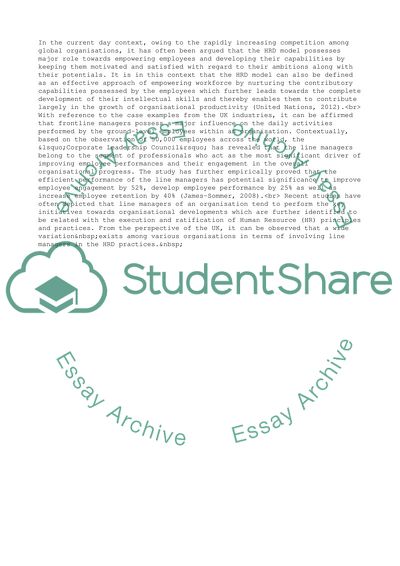Cite this document
(The Role, Skills and Competencies of the UK Line Managers Research Paper - 1, n.d.)
The Role, Skills and Competencies of the UK Line Managers Research Paper - 1. Retrieved from https://studentshare.org/management/1616455-analyse-and-explain-the-role-skills-and-competencies-of-uk-line-managers-in-their-involvement-in-implementing-and-adopting-their-organisations-hrd-strategy-identify-some-of-the-key-challenges-that-line-managers-may-experience-in-managing-ie-impleme
The Role, Skills and Competencies of the UK Line Managers Research Paper - 1. Retrieved from https://studentshare.org/management/1616455-analyse-and-explain-the-role-skills-and-competencies-of-uk-line-managers-in-their-involvement-in-implementing-and-adopting-their-organisations-hrd-strategy-identify-some-of-the-key-challenges-that-line-managers-may-experience-in-managing-ie-impleme
(The Role, Skills and Competencies of the UK Line Managers Research Paper - 1)
The Role, Skills and Competencies of the UK Line Managers Research Paper - 1. https://studentshare.org/management/1616455-analyse-and-explain-the-role-skills-and-competencies-of-uk-line-managers-in-their-involvement-in-implementing-and-adopting-their-organisations-hrd-strategy-identify-some-of-the-key-challenges-that-line-managers-may-experience-in-managing-ie-impleme.
The Role, Skills and Competencies of the UK Line Managers Research Paper - 1. https://studentshare.org/management/1616455-analyse-and-explain-the-role-skills-and-competencies-of-uk-line-managers-in-their-involvement-in-implementing-and-adopting-their-organisations-hrd-strategy-identify-some-of-the-key-challenges-that-line-managers-may-experience-in-managing-ie-impleme.
“The Role, Skills and Competencies of the UK Line Managers Research Paper - 1”, n.d. https://studentshare.org/management/1616455-analyse-and-explain-the-role-skills-and-competencies-of-uk-line-managers-in-their-involvement-in-implementing-and-adopting-their-organisations-hrd-strategy-identify-some-of-the-key-challenges-that-line-managers-may-experience-in-managing-ie-impleme.


